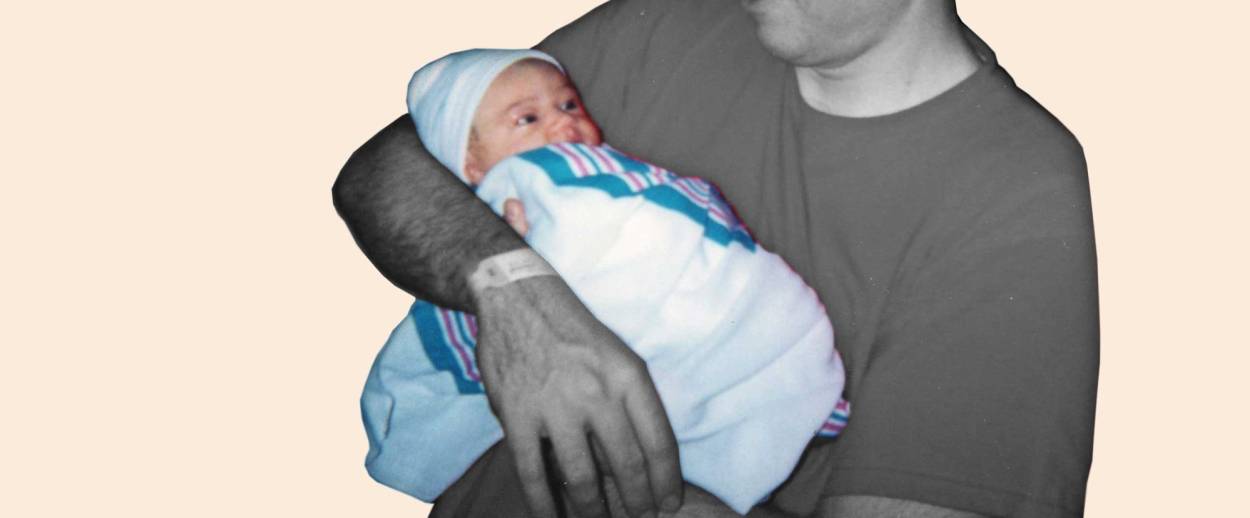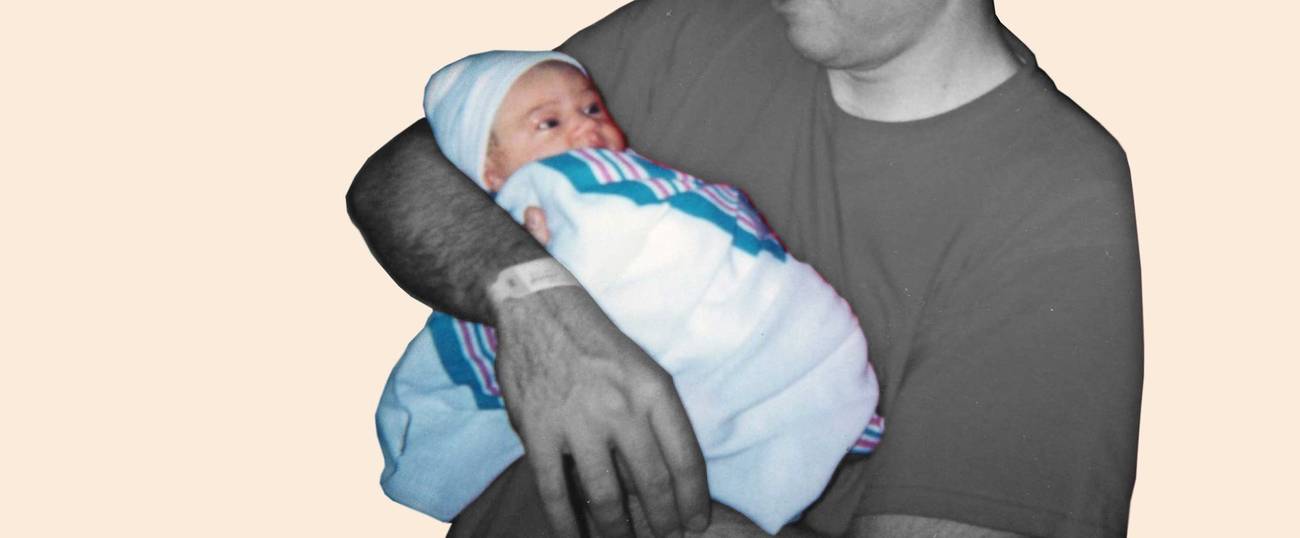Tales of Tragedy: My Inheritance As the Grandson of Survivors
When I tried to hold my newborn daughter, my grandparents’ Holocaust stories stopped me cold




I want to remember nothing more than holding her to my chest. The softness of her small, naked body. The breath. The heartbeat. The plastic hospital bands cinched around her wrist and ankle, and the plastic clamped to what remained of her umbilical cord. The hospital needed to make sure that she was safe, so they tethered a monitor—a LoJack for newborns—to her ankle; but I knew—I cherished the fact—that it would inevitably become my job to protect her. I was happy.
Two days later we were discharged. And, as in those romantic comedies featuring a new baby, I drove half the speed limit.
Then we got home.
Home should have been the clichéd nonstory of a father falling deeper in love with his newborn daughter: a year of tired, happy eyes, and a lifetime of those boring and annoying Facebook updates that nobody, besides grandparents, ever really wants to “like.” But instead, I looked at my daughter and saw the terrible world that had first been revealed to me at my grandparents’ kitchen table, and then later on in a Jewish cemetery in Warsaw.
I had always lived a rather uncomplicated and fortunate life. But in the decade before my daughter’s birth, I had dedicated my time to digging up my grandparents’ Holocaust secrets, the stories that they had forever protected me from.
When my father and aunt were kids, my grandparents had traumatized their children with the retelling of their Holocaust nightmares. (My father actually kept a suitcase packed beneath his childhood bed. His thinking was this: It wasn’t Will the Nazis come to Brooklyn? It was When? And will I be ready?)
Consequently, when I was growing up, my grandparents did all they could to protect me from their tragic pasts. I asked questions, but Grandma distracted me with extra helpings of gefilte fish or a quick recount of the Girl-in-Auschwitz-who-Pished-in-my-Bowl story. Poppy avoided my questions entirely, dealing out the playing cards or turning up the volume to the wrestling match to drown me out. But I didn’t want protection. I wanted to know about my once-young grandparents who had survived a combined seven concentration camps and fought to the end of the Warsaw Ghetto Uprising. I wanted to know about the murdered relatives who hung in the photograph above the light switch in my grandparents’ bedroom.
But as a child and as a teenager, I never did hear those stories. Instead, Poppy died and Grandma fell into the worst kind of mourning. For five years, she did nothing more than cry.
Then, on my yearlong trip around the world, I accidentally wound up in their hometown in Poland and returned to the States with some connection to my grandparents’ lives before the war. From there, Grandma dropped us headlong into the stories of the Holocaust.
Days before the birth, I had been anticipating with such joy the magic of parenthood; instead, I was losing my mind.
She told me about the boy at the gates of Warsaw—“His face on the wall,” she said, describing what happened after the bullet ripped through him—and about the murdered girl in the blue dress from the camps. On that afternoon, we had been surrounded by the color: blue carpet, tiles, muumuu, bowls. Every grim story was hard to hear but also thrilling in a way because I was claiming the stories that my grandparents had condemned to the grave.
For the next six years, I consumed the Shoah. I’d watch a documentary on the camps before work, teach Elie Wiesel’s Night to high school students who had never heard of the genocide, return home to a book on another one of the camps, type out a few manuscript pages about the genocide, and check in with Grandma over the phone. I often called just to say hello, but we would invariably return to Auschwitz or Majdanek or Bergen-Belsen.
Some people were good at baseball, others could knit well; my talent, it seemed, was that I could face these Holocaust stories without being ruined by the horrors. Maybe it was because Grandma’s time was running out. Or perhaps because the door to this past had always been closed to me. Regardless, I became obsessed with documenting my grandparents’ stories.
For that task, I had to push my emotions to the side. I listened to Grandma’s stories and wrote objectively. Occasionally, Grandma stopped talking to take a tranquilizer. To break from the horrors she had reintroduced into her nights. But, selfishly, I would try to push the story forward, back into the excrement of the sewers beneath the ghetto where her comrades had just been shot, or into the hell of Majdanek, where the Nazis killed and tortured for sport.
Grandma’s Holocaust stories had brought us together. I had always misjudged her, as the sort of Jewish stereotype who cleaned and cooked and kvetched. But with these stories, she shocked me, revealing her bravery and heroism and capacity for tragedy. And I guess she trusted now that I could handle them. I loved her for that and hoped to show it by touching the faded green digits tattooed on her arm when the stories were truly grim. But then I went back to the questions because I needed to hear it all.
On a summer day in 2010, inside the Jewish cemetery in Warsaw, I walked from the edge of a mass grave—one that now sat like a crater in the earth after the thousands of Jews in the ground had decomposed beneath the dirt—and stood among the crumbling tombstones of those Jews lucky enough to have lived in a time before the war, when pogroms were more peaceful and anti-Semitism more manageable. I stood among the headstones with a Holocaust survivor, Leo Zisman. He said, “If I had a machine gun, I could kill all of them, the Germans … I hate all of them.”
He went quiet and I thought that he was done talking. But then he walked over to a grave and touched the eroded letters that ran down the tombstone like tears. There was a cry stifled in his chest. And then he said something that would haunt me for a very long time: “I saw a German take a baby, maybe a month old, and rip it up like a chicken.”
The old survivor left me there with that image. I couldn’t move right away. And everything that I ate later that day tasted off. The image would lurk in my brain like a tumor waiting to turn malignant.
Three days after my daughter’s birth—a little more than three years after that day in the cemetery—that thought, that image, metastasized.
My wife was in love. She cooed at the little life we had brought into the world and back to our apartment. She pressed herself against our child with such adoration that it looked like two bodies could become one. My wife couldn’t stop smiling.
“Do you want to hold her?” she asked.
And I did. So badly did I want to hold the little girl that we had named after Grandma, to love my new baby, to protect my daughter. But when I felt her tiny body in my hands—her delicate bones, soft skin, undeveloped muscles—I couldn’t stop picturing the newborn that Leo had delivered to me in the cemetery in Poland.
I kissed her, but couldn’t take her. And every time I looked at her—every time I touched her—I saw that image that Leo had planted in my mind.
“I’m going to pick up some diapers.” I had to leave the apartment; it was suffocating.
Outside, the cold November air seemed to help. But the newborns—the murdered one and mine—kept creeping back in. And now, here I was, out in the world, the very world that had allowed that awfulness.
Days before the birth, I had been anticipating with such joy the magic of parenthood; instead I was now losing my mind.
I thought about seeking therapy. But then I imagined the therapist conjecturing that the story about the Nazi appealed to something sadistic in me. So I buried that plan and walked downhill. The darkness of the night and the darkness of my thoughts started to close in on me. I started to run.
I burst into the supermarket, only to stand among the produce immobile like a madman or a turnip. One of the Korean grocers looked at me.
Eventually, I walked the aisles, plucking from the shelves everything foreign that I didn’t know how to cook. The varieties of seaweed and miso pastes felt like they’d be a good distraction. But it didn’t last long and I deserted all of my groceries when I saw a whole chicken Saran Wrapped on the butcher’s shelf.
Grandma and Poppy had warned me with their Not nows whenever I had demanded their Holocaust stories. Years later, when I was granted access, I thought I had some ability to capture these memories without consequence. I guess, I thought Grandma could see that, too. But I didn’t have that faculty, which obviously revealed itself in the delivery room like a second, afflicted organ of the afterbirth.
As it happens, a few months ago, my father revealed to me the one story that had made him never want to hear another one of Grandma’s Holocaust memories. When he was a boy, she had told him how the baby in the family photograph had died. But because the book that I was writing about my grandparents, which featured the photograph, was about to be published, he felt it was time that I learn the whole story. But that detail taught me something even more incredible: I realized that this one detail about the murdered baby was a fact that Grandma had refused to share with me, no matter how many times I asked about the infant’s fate. Until the very end, Grandma had known exactly what to shield her grandson from.
***
When I returned home from the grocery store, I went into the bedroom to watch my daughter sleep. I stood over her crib and watched her soft, small body squirm. I inhaled her exhalations. I testified to her heartbeat. And I knew that I had too much love for that little girl to not be able to separate one tragic event from one that was supposed to be happy.
Perhaps I needed her to gain a few pounds, to feel more sturdy, to shed that smell of birth and utter innocence. But for some time, I could only hold my baby for so long.
Noah Lederman is the author of the memoirA World Erased: A Grandson’s Search for His Family’s Holocaust Secrets. His articles have been featured in The Economist, The Boston Globe, The Miami Herald, Slate, Salon, The New Republic, The Jerusalem Post Magazine, and elsewhere. He writes the blog Somewhere Or Bust.